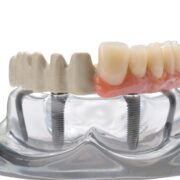Dental implants have become one of the most popular and effective solutions for missing teeth. They are a long-lasting and reliable way to restore your smile and improve your oral health. But what exactly are they, and how do they work? If you’re considering getting them, it’s important to understand the basics of the procedure, the benefits, and who is a good candidate. In this complete guide to dental implants, we’ll explore everything you need to know about this innovative treatment. From the types of them available to the procedure itself, we’ll cover it all. So, whether you’re missing one tooth or several, keep reading to discover how dental implants can transform your smile and your life.
Understanding the Anatomy of a Dental Implant
Dental implants are a two-part system consisting of a small titanium post and a dental crown. The titanium post is surgically implanted into the jawbone, where it fuses with the bone over time. This process is known as osseointegration and is what makes them so durable and long-lasting.
The dental crown is then attached to the titanium post using an abutment. The crown is custom-made to match your natural teeth. They can be used to replace a single tooth, multiple teeth, or even a full set of teeth.
It’s important to note that dental implants require a healthy jawbone to be successful. If you have experienced bone loss in your jaw, you may require a bone graft before getting them. Your dentist will be able to determine if you’re a good candidate for them based on a thorough examination of your teeth and jawbone.
How Dental Implants Work?
They work by replacing the root of a missing tooth. The titanium post is surgically implanted into the jawbone, where it fuses with the bone over time. This creates a stable and durable foundation for the dental crown. Once the titanium post has fused with the jawbone, the abutment and dental crown can be attached. The dental crown is custom-made to match your natural teeth, ensuring a seamless and natural-looking result. Dental implants are a type of tooth replacement option that involves surgically placing a metal post into the jawbone. This post serves as an artificial tooth root and provides a stable foundation for a replacement tooth or bridge.
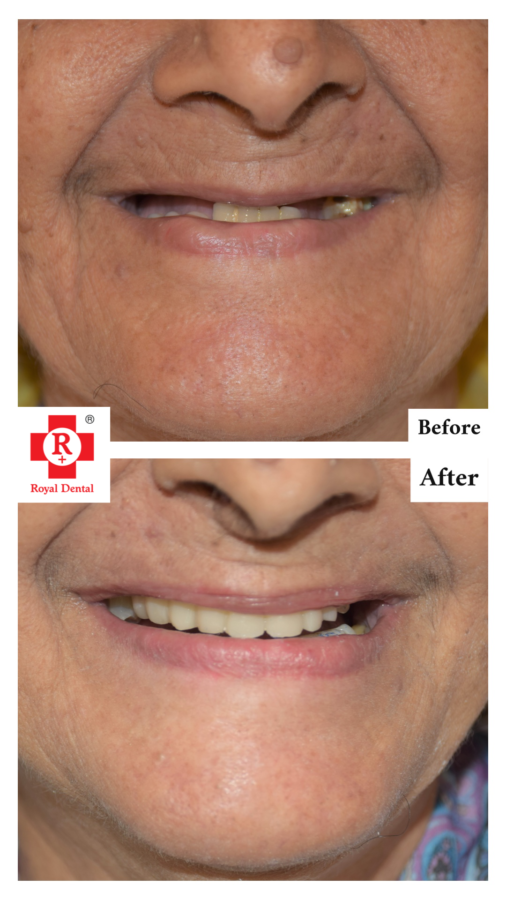
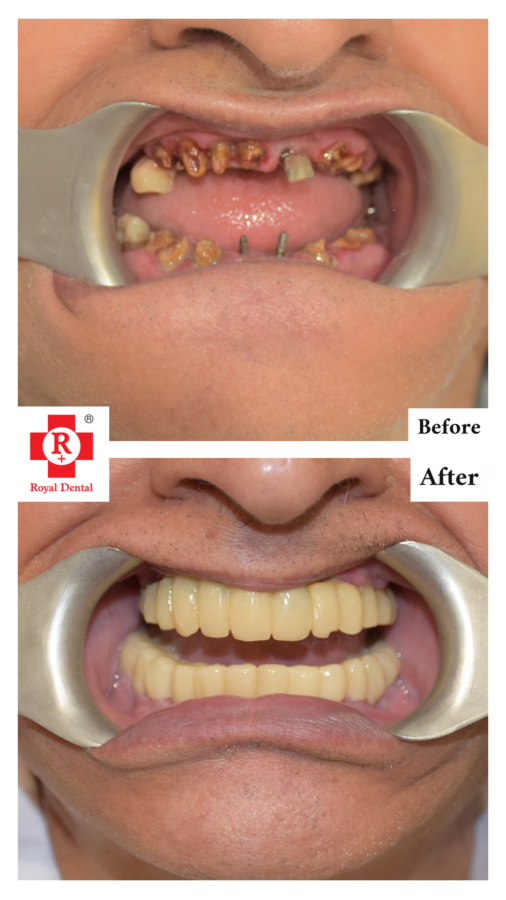
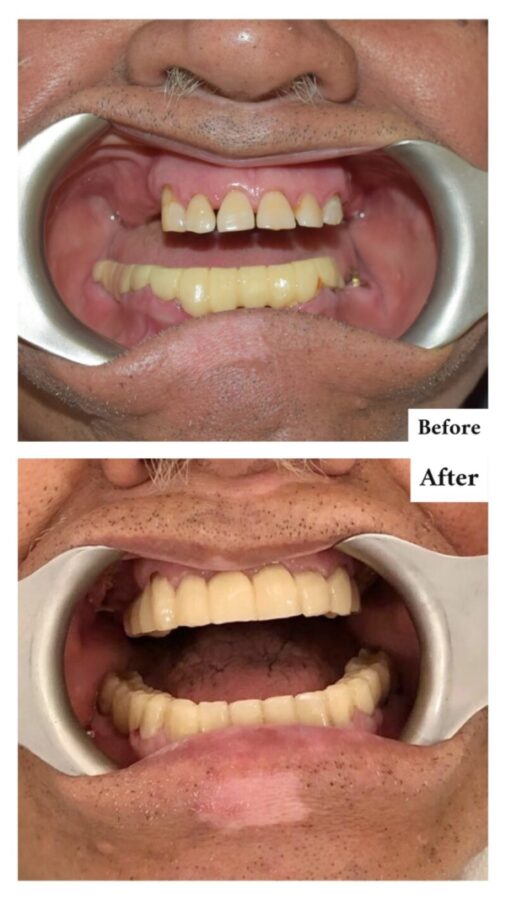
Consultation: The first step is to schedule a consultation with a dentist or oral surgeon who specializes in dental implants. During this appointment, the dentist will evaluate your oral health and determine whether you are a good candidate for dental implants.
Preparation: If you are a good candidate, the next step is to prepare the jawbone for the implant. This may involve extracting a damaged or decayed tooth or building up the jawbone if it has deteriorated due to missing teeth.
Implant placement: Once the jawbone is prepared, the dentist will surgically place the implant post into the bone. The post is typically made of titanium, which is a biocompatible metal that fuses with the bone over time.
The working of dental implants for better understanding.
Healing: After the implant is placed, the jawbone needs time to heal and fuse with the post. This process is called osseointegration and can take several months to complete.
Abutment placement: Once the post has fused with the bone, the dentist will place an abutment on top of the post. This abutment serves as a connector between the post and the replacement tooth.
Replacement tooth: Finally, the replacement tooth or bridge is attached to the abutment. This replacement tooth is custom-made to match the size, shape, and color of your natural teeth.
Who is ad ideal candidate for Dental Implants?
Most people who are missing one or more teeth are good candidates for dental implants. However, some factors may impact your eligibility for the procedure.
Sufficient Jawbone Density: Dental implants require sufficient bone density and volume in the jawbone to support the implant post. If there is not enough bone, bone grafting may be necessary to build up the bone before the implant can be placed.
Healthy Gums: Good oral hygiene and healthy gums are important for the success of dental implants. Gum disease can lead to implant failure, so it is essential to treat any existing gum disease before proceeding with implants.
Overall Health: Candidates should be in good overall health and free of any medical conditions or medications that may impair healing after surgery. They should also have healthy immune systems to prevent infections.
Candidates for dental implants for better understanding.
Age: Dental implants can be placed in adults of any age, but younger individuals may still be developing their jawbones, which can affect the success of the implant. The dentist or oral surgeon will consider the individual’s age and bone growth when determining if dental implants are appropriate.
Smoking: Smoking can increase the risk of implant failure by decreasing blood flow to the gums and bones. Candidates who smoke may need to quit smoking or reduce their smoking to increase the likelihood of successful implant placement.
Commitment to Oral Hygiene: Good oral hygiene is critical for the success of dental implants. Candidates should be committed to maintaining proper oral hygiene and attending regular dental checkups.
Benefits of Dental Implants over other Replacements
✪ Durability: They are made of durable materials such as titanium, which allows them to withstand the pressures of chewing and speaking, making them a long-lasting solution.
✫ Natural Look and Feel: They are designed to look and feel like natural teeth. They are custom-made to match the color, size, and shape of your existing teeth.
✪ Improved Speech: Unlike dentures that can sometimes slip or make clicking noises, dental implants are a permanent solution, which means you can speak clearly and confidently without worrying about any embarrassing mishaps.
✫ Increased Comfort: They are anchored directly into the jawbone, which means they don’t move around like dentures or bridges. This makes them more comfortable to wear and easier to maintain.
✪ Improved Oral Health: Traditional tooth replacement options like bridges require the adjacent teeth to be ground down to accommodate the bridge, which can lead to long-term oral health problems. Dental implants do not require any alterations to your existing teeth, which means your overall oral health is preserved.
✫ Long-Term Cost Savings: While dental implants can be more expensive upfront than other tooth replacement options, they have a longer lifespan and require less maintenance over time. As a result, they can be a more cost-effective solution in the long run.
Dental Implant Procedure: What to Expect?
The procedure typically involves several steps. First, the titanium post is surgically implanted into the jawbone. This process is typically done under local anaesthesia and is relatively quick and painless. After the titanium post has been implanted, a temporary crown may be placed while the jawbone heals around the post. This process typically takes several months. Once the jawbone has healed. The dental crown can be attached. The dental crown is custom-made to match your natural teeth, ensuring a seamless and natural-looking result.
Aftercare and Maintenance
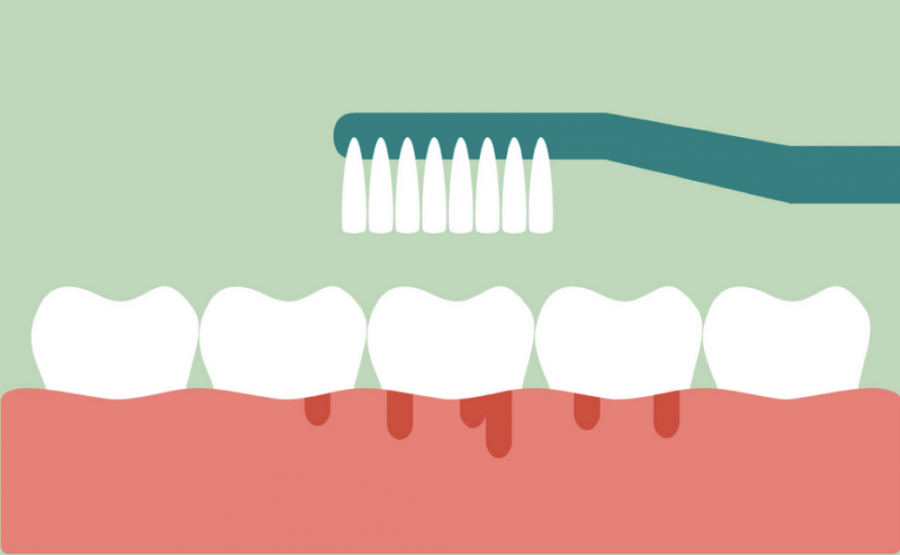
Brush and floss regularly to keep them clean and free of plaque buildup.
Avoid chewing on hard or sticky foods, as these can damage them.


See your dentist regularly for checkups and cleanings. With proper care and maintenance, your dental implants can last a lifetime.
Common Myths and Misconceptions
Several myths and misconceptions about dental implants can prevent people from considering this innovative treatment. Here are some of the most common myths about
- Painful: While the implant procedure may cause some discomfort, most people report only mild pain and discomfort.
- Expensive: While they may be more expensive than other tooth options, they are durable solution that can save you money in the long run.
- Dental implants are not for older people: Age is not a factor in determining eligibility for dental implants. As long as you have a healthy jawbone, you may be a good candidate for the procedure.
Choosing the Right Dental Implant Provider
Experience and Credentials: Look for a provider who has extensive experience and training in implant dentistry. Check their credentials and qualifications, including whether they are board-certified in implant dentistry.
Technology and Equipment: They should have access to the latest dental implant technology and equipment to ensure precise and effective implant placement.
Patient Reviews : Look for reviews and testimonials from previous patients to get an idea of the provider’s quality of care and patient satisfaction.
Consultation Process: A reputable provider should conduct a thorough consultation to evaluate your oral health, discuss your treatment options, and address any questions or concerns you may have.
Cost and Insurance Coverage: Consider the cost of the procedure and whether the provider accepts your insurance or offers financing options to make the procedure more affordable.
Follow-Up Care: A good provider should provide follow-up care to monitor the healing process and ensure the long-term success of your dental implant.
Referral or Recommendation: You can ask your regular dentist or friends and family for a referral or recommendation for a dental implant provider they trust.
Frequently Asked Questions
Q: How long do dental implants last?
A: With proper care and maintenance, dental implants can last a lifetime.
Q: Is the dental implant procedure painful?
A: While the implant procedure may cause some discomfort, most people report only mild pain and discomfort.
Q: How much do dental implants cost?
A: The cost of them varies depending on the number of implants needed and other factors. Your dental implant provider will be able to provide you with an cost estimate.
Conclusion
They are a long-lasting and reliable solution for missing teeth. With proper care and maintenance, they can last a lifetime. If you’re considering getting them, it’s important to understand the basics of the procedure, the benefits, and who is a good candidate. By following the tips outlined in this guide and choosing a reputable dental implant. you can restore your smile and improve your oral health with confidence.


